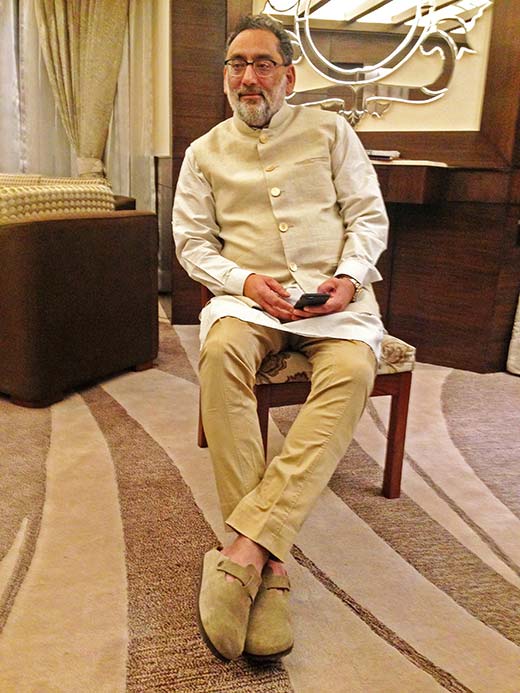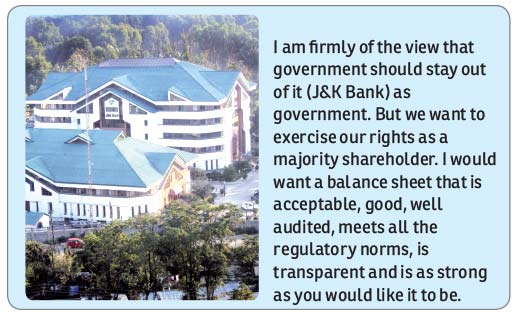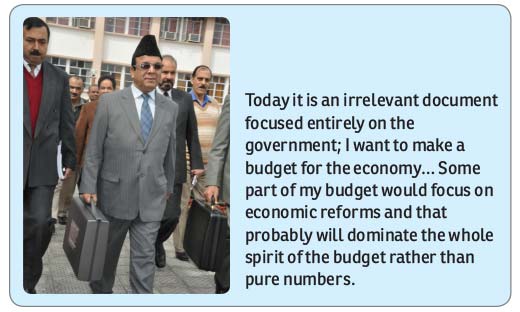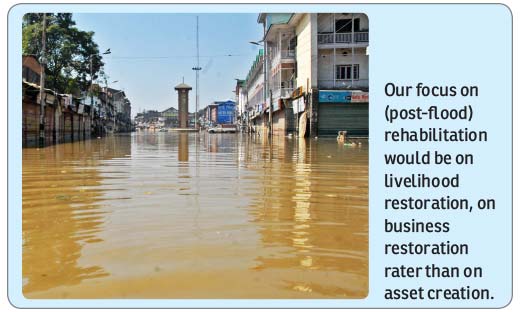Ever since he joined politics in the summer of 2014, economist Dr Haseeb Drabu has remained busy 24×7. After helping his party contest Lok Sabha elections, his personal campaign from Rajpora for assembly was intensely challenging. Once the results were out, his elevation to the lone key negotiator for alliance formation with BJP which staggered to nearly 60 days he travelled extensively. After taking over as Finance and Culture Minister, Drabu is still not at peace with himself. He works nearly 20 hours a day. Busy drafting his maiden budget amid intermittent interventions that the coalition still requires, Drabu in his first free wheeling interview to Kashmir Life spoke on economy, public finances and how the elections have changed his views fundamentally.
 Kashmir Life (KL): From being a member of a small economic reforms related Madhav Godbole committee in 1997 to becoming the finance minister of the state in 2015, it has been a real long journey. How bad, good and rewarding it has been?
Kashmir Life (KL): From being a member of a small economic reforms related Madhav Godbole committee in 1997 to becoming the finance minister of the state in 2015, it has been a real long journey. How bad, good and rewarding it has been?
Haseeb Drabu (HD): That was not a small committee on public enterprises but a very significant initiative for economic reforms tasked to take a long term view of the economic policy of the state. That was a very useful beginning and this (becoming Finance Minister) is the culmination of that journey.
It has been interesting and very fulfilling at personal and professional levels. I derived a lot of satisfaction in my various roles as economic adviser, as chairman of J&K Bank. And hopefully as the Finance Minister, it would give me a greater satisfaction to try and give the state economy a new direction which I tried to do, initially, as Economic Adviser for the state economy, then as chairman J&K Bank for state’s largest lending institution.
KL: Earlier you advised people at the helm and now you are at the helm. Are your challenges pretty different from your predecessors?
HD: Off course, very different. As an adviser there was no terminal responsibility as you are not decision maker. But as Finance Minister you are the decision maker. But between my being adviser and now Finance Minister, there came an event – the elections. I contested from a rural constituency (and) it changed my views on economic policy substantially. So if I say as Economic Adviser, I tried to bring in principles of micro economics and finance into state’s economic policy, as Finance Minister there is lot of realism what I want to do.
My economic expertise, if you want to call it that, has been tempered to a larger extent by my experience as a politician and I see things very differently. So apart from roles, I say, there was an evolution of me as a person also and (now) I see things differently today.
KL: As economic adviser, you created J&K’s new economic architecture. Now when you are back, what is the quantum of change in that and how you intend to undo that intervention?
HD: I had created new financial architecture for a sub-national economy. I think I have come back to a financial situation which is perhaps much worse than what it was then. The crisis has deepened in terms of fiscal crisis of the state. Also a couple of things, policy changes have happened, which are significant.
One of them, being that the lender of last resort is no longer the J&K Bank so the challenge is different, which is a big negative.
 I think J&K Bank has moved in a different direction, where I had left it. I had seen the bank will focus on the state but it has gone out of that business model. From what I see in public domain the balance sheet is not as strong as robust, as transparent, as prudent as it was when I left.
I think J&K Bank has moved in a different direction, where I had left it. I had seen the bank will focus on the state but it has gone out of that business model. From what I see in public domain the balance sheet is not as strong as robust, as transparent, as prudent as it was when I left.
KL: You are talking about state’s only listed company but how can it come back to the model you had created for it?
HD: It is a really an issue of corporate governance. I am firmly of the view that government should stay out of it as government. But we want to exercise our rights as a majority shareholder. I would want, really speaking, a balance sheet that is acceptable, that is good, well audited, meets all the regulatory norms, is transparent and is as strong as you would like it to be. That is one. Second, we would like to see a lending strategy that is profitable for the system as a whole (and) not a particular account or a particular sector but a lending strategy that is in line with the larger objective of high profitability, high stability of bank and also a part of the larger economic policy of the state.
KL: J&K public finance has invariably been discussed within three ingredients – begging bowl, corruption, and gradual surge in revenue expenditure. Can there be a change?
HD: One thing I want to do in this budget and subsequent budgets, if it is possible, is to restore the dignity of the people of J&K and government of the place. I have been very distressed always when I hear about this begging bowl thing. And I would want to change directionally the manner that we are not going with begging bowl to anybody be it the central government or any body else, for that matter. We have a case for a fiscal situation which has a history and legacy.
I would want to make a break from the past very clearly and decisively, not just in terms of direction of the budget but the budget itself. I would also try to make budget relevant to the state. Today it is an irrelevant document focused entirely on the government; I want to make a budget for the economy. I think that is an important change.
This change has been made possible by some basic changes that have taken place subsequent to the 14th Finance Commission award whereby the lot of freedom has been given to the states and it is now the responsibility of the states to manage their finances well. Finance Commission has changed the fiscal federal relations. Since, we will be the first state to present the budget after the 14th Finance Commission award, so I would like to present a creative budget that is an example to follow and sets the standard for all states budgets in the future.
 We know the awards; we know the Indian budget, so we are better placed to do a budget which will, I hope, take us away from the begging bowl syndrome, if not in next two years but certainly after 4-5 years.
We know the awards; we know the Indian budget, so we are better placed to do a budget which will, I hope, take us away from the begging bowl syndrome, if not in next two years but certainly after 4-5 years.
KL: What will happen to surging revenue expenditures? Your salary component is nearly half of your yearly spend?
HD: Revenue expenditure, per se, at the state level is not very bad. We keep talking about salaries being large but you must also recognize that salaries at the state level are salaries of teachers and doctors, and cops who are doing social and developmental services. It is unlike the revenue expenditure of the central government which is almost entirely on the bureaucracy. So let us make a distinction.
Post 1991 liberalization, a large part of the social human expenditure was shifted to the states. So by division of responsibility itself, revenue expenditure has to be high so I am not particularly concerned about the revenue expenditure per se.
On salaries, the solution to this problem (terming wages as wasteful expenditures) lies in making these services productive. If we make them productive, we will not have a problem. I see it not as a budgetary problem but a public expenditure management issue, a governance issue – if teachers and doctors deliver, they are well paid, if they do not deliver or have not been delivering up to the standards it becomes an issue. So I will address it from that perspective of efficiency of expenditure rather than the quantum of expenditure.
KL: In the first Vote on Account you were associated with as Economic Adviser in 2003, you talked of ‘fiscal sin’ in which J&K has been living for years. Is that “sin” still relevant?
HD: I think it is still relevant. The fiscal sin continues. If you look at the last communication I saw between the state and the central government there is a deficit of around Rs 9000 crore. That deficit is the fiscal sin we live in. It continues. Just because I have come here does not mean it will just vanish.
The structure of the budget is very critical and I am going to change that. We have been living in self denial, in fiscal sin, we will try and see how we could remedy that and make sure that at least a structure is put in place whereby it will not be easy to do what has been happening so far. We will have to build a base in this budget for which little time is available but still we are working to do that. We will build (this structure) in next two three years and see that what time in next three years we are in some sort of fiscal mode which is improved and better.
KL: If we read CMP which has obvious focus on economics especially the energy and then if we see the budgets of the past of which you were a part, do you see going back to the days when budget was bisected and energy separated from the rest of it?
HD: I think I will go back to what was done then. We used to have a separate power budget. I do not know why the good practice was given up.
The argument was very simple; the simple proposition is that the fiscal balance is in the mess because of power. Once you take power out of the situation J&K’s fiscal balance becomes reasonable. When you separate the power, you isolate the problem; you do not have to distort the entire fiscal transfer system to meet that hole. I remember getting a grant of Rs 1300 crore per annum.
 One of the arguments in discussions with various people in central government which we made during the creation of this alliance was that why do you want to fund the power gap in perpetuity, which may amount to Rs 50-60 thousand crore in a period of next five six years. And (instead) why do not you transfer an asset for which there are genuine reasons, in which case it is a win-win situation for both, the state and the centre. And that has been given a thought.
One of the arguments in discussions with various people in central government which we made during the creation of this alliance was that why do you want to fund the power gap in perpetuity, which may amount to Rs 50-60 thousand crore in a period of next five six years. And (instead) why do not you transfer an asset for which there are genuine reasons, in which case it is a win-win situation for both, the state and the centre. And that has been given a thought.
My sense is that the road to fiscal balance in J&K is through power sector reforms. The day power sector becomes all right, the fiscal balance is restored. So I would think that this time also go back to insulate the problem of power sector in the means of power budget and see if we can raise, extra-budgetary resources for power so that it does not distort the main budget.
KL: Your party manifesto has region specific initiatives. You want different areas to be promoted for different economic activities. Will you budget follow the same line?
HD: It will be very difficult to do it this year. But eventually I wish to see that – not so much in terms of budgetary allocation but in terms of budgetary policies. I think one thing that has not happened in last few years is to use the budget as a means to propagate a public policy – certain kind of expenditure policy, fiscal policy and reforms. This is one forum where you can seek legislative approval for reforms and build a consensus on it. Some part of my budget would focus on economic reforms and that probably will dominate the whole spirit of the budget rather than pure numbers.
KL: Kashmir’s heritage handicraft sector is slowing down, and your apple economy is facing a competition as the plantations are getting older. How will you address these basic bread and butter issues of Kashmir?
HD: Absolutely. You need to see agriculture in two parts – commercial agriculture and subsistence agriculture. The main policy I would like to pursue in next three years is that commercial agriculture must drive through private investment and subsistence agriculture through public investment. We will provide enabling environment for private investment in commercial horticulture. Starting from the way orchards are laid out, the way they are populated, the way post harvest happens and transportation is done, agriculture infrastructure would be a major focus for us.
As regards subsistence agriculture we still want to do some degree of public investment so that the basic essential goods, the food economy of the state is not distorted and is not solely dependent on imports. That is the key question we would want to address.
In crafts we see not so much the rate of growth coming but spread of growth coming. A one rupee would spread over 40 houses whereas the same rupee in industry is spread on half a house. So we are looking at traditional historical industries of Kashmir as providing the spread of growth. So does the horticulture and tourism. Then SMEs would provide the rate of growth. So when you combine the spread of growth with the rate of growth you will get a very vibrant model.
KL: There is massive stagnation in the primary sector, your secondary sector is gradually weakening unlike the robust tertiary sector. Given the youth bulge and the state of unemployment you are confronted with, which sector you will focus to manage the crisis?
HD: There is no way out other than creating employment through private enterprise. I do not want to create a situation of micro employment. No. It has to be region specific where the regional growth model starts working.
 We have talked about one very viable idea for potential employment – instead of making model village where you have infrastructure like community halls which was never used, we must look at model business villages like apple village in Kashmir and model Basmati village in Jammu. You will create the entire business infrastructure for local employment where your youth will get engaged.
We have talked about one very viable idea for potential employment – instead of making model village where you have infrastructure like community halls which was never used, we must look at model business villages like apple village in Kashmir and model Basmati village in Jammu. You will create the entire business infrastructure for local employment where your youth will get engaged.
My father has orchards but I am not interested in going to the orchards because they are still run in the feudal mode, without any professionalization or any scientific methods. But if the orchard changes the model lines, has packaging and sorting lines, a well qualified person may work in the orchard. Europeans have it all. Conversion in jams and jellies is in all over Europe – the size is very small and it is localized. That will generate a lot of local employment and the youth bulge will get back to those areas.
Similarly in crafts, we need to take China as an example. How to use technology into that and see you raise the level of crafts from being what they were to modern professional crafts? And they will have a lot of value. I have been arguing for a long time we should have a craft management degree. How we can use our youth into that? The other way to adjust youth is to use them to deliver services be it health, educational services. We can look at that as an option
But what my point really is that employment will have to follow output. You first need to grow and then growth will create opportunities for self employment and we need to change the skill profile. Today we are looking at class IV and class III as an option for employment. We need to look at entrepreneurial employment and managerial employment in government acnd outside, which is critical. I do not think we have addressed the employment from the right perspective. The biggest deficit is skill deficit. Once I create it, jobs are around. Today you have jobs but not skills. You need to impart skills and re-skill the youth which will remain a major policy focus.
KL: How you will be tackling urban poverty that has suffered seriously after the September 2014 floods?
HD: I think this is the biggest challenge we are facing. I think crafts will come as an important segment, where I was talking as distribution of growth. Once the growth is distributed, it generates incomes at that level.
The rehabilitation has to be focused. We have not to build assets but businesses. Please remember, we can build good houses if we have good business. For some strange reasons, the general tenor of the argument of rehabilitation is making houses. I think the basic challenge is to restore livelihood. Once the livelihood is around, then there will be houses. Our focus on rehabilitation would be on livelihood restoration, on business restoration rather than on asset creation and that is the way to address the poverty that was increased by these floods in urban Kashmir.
KL: You are culture minister too, perhaps the first FM who is also a culture minister. Is there a link between the two?
HD: This is my biggest joy. I think one of the biggest damage that was done in last 25 years is that we were de-culturalized. Our culture is very rich, diverse, but has not got the required attention. Culture is a significant part in identity building. I want to use this opportunity to not just restore, revive, propagate or preserve but to professionalize the culture and give it a dimension so that it feeds into the identity of the people of J&K. For large part of me, at least personally, is cultural, before it is political. But somewhere in last 20 years that has been lost, be it in the form of language, be it in the form of arts, crafts, I see them as culture industries. I would do this with a lot of excitement. This is for the first time that there is a separate culture ministry. Culture has never got the money it deserves. And being Finance Minister I would ensure that the cultural segment does not suffer for the lack of money. That much is assured.
KL: GST is round the corner. How will J&K retain the exclusivity and autonomy in a uniform tax regime?
HD: Under GST regime, states will be surrendering its exclusive authority to tax goods and services. The power to raise tax is being bartered for a share in central revenues. This as has been proved by the past is never a good bargain – the former is autonomy, the latter is dependence. That is the key element to it.
KL: So how will you tackle it?
HD: It has gone beyond a stage where it can be rolled back. The big challenge was to see how to maintain exclusive taxation domain of J&K and yet bring an efficiency gain of GST. That has not happened. So we will in some ways be subsumed by the GST. Earlier an option was that you could have a two tier GST – one that would be central and another that would be done by the state government. That is not possible now.
So the best one can do is to retain some exemption list. Under the provisions of GST, the way it is designed, it is extremely difficult. You can not do it as finance minister. It has to go to the union finance minister, after getting consensus of 29 states. So it will be virtually finding it difficult to have a negative list. It has passed that stage but we will see what still can be done.
It is not much under the Article 370. The more critical element is the sales tax act which allows us to tax goods and services unlike any other state in the country. So we have the powers with us. If you are surrendering that, we do it. J&K has exclusive provisions of taxation which will be subsumed by this act. We should now try and see whatever we can save. To my mind, somewhere, it may be possible to look at giving an exemption list under GST which is not permissible.
















Singapore has a great variety as far as wildlife and marine life is thought
of. The hills and the natural beauty is the integral part of the hill station and the
journey to the hill station is not considered complete
if the places that offer full view of the hills and their curves are visited.
No, this is not a description of the famous bay Listrigonov with its bloodthirsty giants,
from which escaped valiant Odysseus.